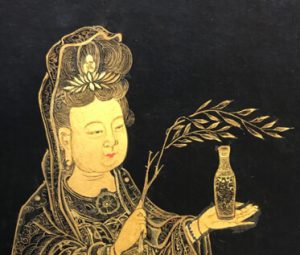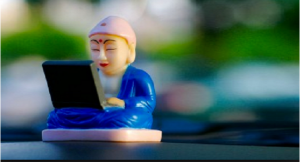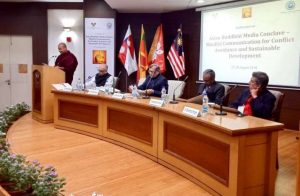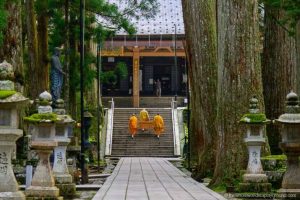
The Korean Seon (Zen) master Venerable Pomnyun Sunim (법륜스님) wears many hats: Buddhist monk, teacher, author, environmentalist, and social activist, to name a few. As a widely respected Dharma teacher and a tireless socially engaged activist in his native South Korea, Ven. Pomnyun Sunim has founded numerous Dharma-based organizations, initiatives, and projects that are active across the world. Among them, Jungto Society, a volunteer-based community founded on the Buddhist teachings and expressing equality, simple living, and sustainability, is dedicated to addressing modern social issues that lead to suffering, including environmental degradation, poverty, and conflict.
This column, shared by Jungto Society, presents a series of highlights from Ven. Pomnyun Sunim’s writings, teachings, public talks, and regular live-streamed Dharma Q+A sessions, which are accessible across the globe.
The following teaching was given in Vancouver on 8 September. This article is the eighth in a series taken from Ven. Pomnyun Sunim’s Dharma tour of Europe and North America—his first overseas tour since the pandemic. Titled “Casual Conversation with Ven. Pomnyun Sunim: Come Talk about Life, Wisdom, and Happiness” the Dharma tour ran from 1–22 September 2023, taking in 21 cities: six in Europe and 15 in North America.*

Ven. Pomnyun Sunim: With the COVID-19 pandemic, it’s been four years since I could come here. How have all of you been? Raise your hand if you passed away during that time? (Audience laughter)
I see that not one of you have passed away. As for me, I did a lot of farming during the pandemic, living in a closed-down school that we rented near Gyeongju. For three years, I barely ventured out any farther than that. Then, last autumn, I visited India, the Philippines, and other places where we work. At the beginning of this year, we resumed the Jungto Society pilgrimage to India. In the spring, I visited 12 countries in Southeast Asia, and this fall, I’m going around Europe and North America for our Casual Conversations. It’s wonderful to see and meet you all.
I suffer from comparing myself with others
Q: I’m troubled by my tendency to compare myself with others. I am now in my 50s, and after much deliberation I went back to school. I was worried whether I would be able to keep up with the class because I was not confident in my English proficiency and also concerned about my age. So before going to class, I bought the textbooks and studied really hard in advance, and as a result the school lessons felt really easy. With newfound confidence, I made a resolution to aim for a perfect score in all subjects and become a legend at this school.
I studied diligently, even limiting time for meals. On the first exam, I made a mistake and got one question wrong out of 50. Getting one question wrong was somewhat forgivable, but I later found out that besides me, two other students in the class had also missed just one question. I was so upset that I had missed the opportunity for a perfect score by making a mistake on an easy question, and I felt frustrated for two whole days.
On top of that, the student sitting next to me spends time with his family and actively participates in church activities, yet his grades are better than mine. As I dedicate myself entirely to studying, it feels unfair and disheartening. The desire to excel and win can be a driving force for me, as I want to do better than others. However, I also suffer because of it. How can I develop a mindset that is not overly attached to outcomes?
Ven. Pomnyun Sunim: Let go of your greed! (Audience laughter)
For example, let’s say I’m competing in a 100-meter sprint against a young man. He completes the 100-meter sprint in 13 seconds, while I finish it in 25 seconds. Even if I practice day and night while the young athlete is out having fun, can I beat the young athlete? Does that mean I’m an inferior being because I can’t beat the young athlete?
Q: No, that doesn’t mean you’re inferior.
Ven. Pomnyun Sunim: This isn’t even something you can compare. I think you go beyond being greedy and are also being rather dimwitted! (Audience laughter)
At first, when I heard that studying for school at your age became easier thanks to your preparation in advance, I thought, “This person is amazing.” But as I continued listening to your words, I heard that you made a resolution to achieve a perfect score and become the top student. Your courage is commendable, but it seems excessively greedy.
It’s good when you challenge yourself to attain a perfect score. However, trying to outperform younger students and feeling jealous because they excel while enjoying themselves falls into the category of envy. Since olden times, envy has been considered one of the sins. What I mean by “one of the sins” isn’t that it’s bad, but that it’s an action that greatly torments oneself.
Don’t be jealous; just do your best. Entering university in your 50s alone is already remarkable. Just that fact by itself could make you a legend. Furthermore, if you become an outstanding student on top of that, you become a legend among legends. You don’t have to be number one to become a legend!
Q: Financially, I’m at a level where I can live comfortably without having to struggle. But a few days ago, I felt very upset after meeting a friend I’ve known for a long time. I didn’t know my friend had that much money. My friend said that they already have enough money to live on until they die because they invested the money their parents gave them. When I heard that, I felt deeply bothered and went through two days of agony. What should I do?
Ven. Pomnyun Sunim: Don’t worry, you also have enough money to live on until you die. The only difference is that your friend can spend $10,000 a month and has enough money to last their lifetime, while you can spend $1,000 a month and also have enough money to last your lifetime.
Q: But I want to spend $10,000 every month.
Ven. Pomnyun Sunim: If you were to spend $10,000 a month, that could be considered a crime. The planet is facing a climate crisis. What is the main cause of the climate crisis? People are consuming too much. Those who have excessive consumption patterns should not be seen as role models, but rather as the culprits who are harming the planet and humanity. We need to make excessive consumption a crime by law. Even if a criminal who murders one person is eligible for parole, they still receive a prison sentence of at least 10 years. However, those who engage in excessive consumption bring about a cumulative result of the deaths of thousands and millions of people. Therefore, overconsumption should be considered a serious crime. The social norm needs to gradually shift in this direction. In a climate crisis, overconsumption should be seen as something to target with legal action.
To mitigate the climate crisis, we need to establish a cap on consumption, allowing individuals to possess wealth but setting a limit on how much one can spend in a month. Laws should be enacted stating that “exceeding a certain amount of monthly expenditure constitutes a crime that leads to the annihilation of humanity.” Only then can we hope to prevent the current climate crisis. Otherwise, humanity faces the prospect of extinction. Therefore, overconsumption should never be admired. Your statement is akin to wanting to emulate such a crime, like saying you want to emulate a drug addict. If any of you gathered here envy those who have a lot of money and engage in overconsumption, you are essentially admiring that crime.
Many of you who live here in Vancouver have recently suffered greatly from wildfires caused by climate change, haven’t you? Even after experiencing such a disaster, it seems like you still haven’t come to your senses. How much more suffering must humanity endure before they come to their senses? Overconsumption should never be admired. Instead, we should cultivate a culture that condemns it.
Q: I understand. I am also very concerned about the environment. I will live modestly. Thank you.
Ven. Pomnyun Sunim: Is it easier to not spend money when you don’t have much? Or is it easier to not spend for the sake of the planet even when you do have money? It’s much easier to not spend when you don’t have money. When you have a lot of money but can’t spend it even though you want to, that can also be a significant source of suffering.
I view our continued adherence to consumerism as “consumption addiction.” This is a problem that can’t even be compared to drug addiction due to the scale of its harm. That’s why it’s crucial that we break free from consumption addiction. In Europe, the culture among young generations in their teens and 20s has completely changed. If parents prepare a lavish meal at home, their children simply have a small portion and leave. I know someone whose son is in their second year of high school, and their son refuses to buy new clothes and goes to school with worn-out shoes. No matter how much the parents insist on buying new clothes, he doesn’t listen. In some areas, these behaviors are becoming part of school culture.
Just as there was the hippie culture in the past, today’s youth are creating a different culture in the era of our current climate crisis, distinct from older generations. It’s not just children from poor households; those from wealthy families are like this too. I received a similar question during a Dharma talk in Europe the other day. The parents prepare generous meals for their children, but the kids won’t eat it. They said they only take one cucumber and one boiled potato for breakfast before heading to school. The parents who asked the question felt so upset.
What used to be considered important keeps changing. A few days ago, during the Dharma talk in Paris, a woman talked about how she couldn’t stand her husband not taking showers. So, I replied, “A saint has arrived in your household.” It means a saint who is trying to save the climate has appeared. Over-washing is not good for the body. Especially in the United States, people tend to wash themselves too often and have excessive consumption habits. They consume to the point where it should be punishable as a crime, and they don’t even practice proper recycling.
Today, humanity is racing toward destruction due to consumerism. If we look at history, many ancient monarchs and rulers led their countries to ruin through overconsumption. People of that time may have admired such rulers, but in the end, their actions led to the downfall of nations and the suffering of the people. Similarly, overconsumption accelerates the climate crisis and plunges humanity into agony. We should never admire consumerism. Instead of feeling inferior while envying it, we should first correct our own view of life.
Whenever I see someone living in a big house, my first thought is, “Cleaning that must be really hard.” I never think, “I wish I could live in a house like that.” If you want to have spacious rooms, why not sleep in a classroom? How large are classrooms, after all? (Audience laughter)
Our worldview needs to change now. With the worldview we’ve had so far, we can’t overcome the climate crisis. How many more deaths and how much more suffering will it take for us to realize that this way is truly wrong? During the Opium War, the Chinese people only recognized the dangers of opium after they became addicted to it. However, the wise should have foresight and recognize the dangers beforehand, saying: “This will really put us in danger.” But ultimately, I think people will only wake up after more than half of us die.
These days, with the ongoing war between Ukraine and Russia, and the escalating competition between the United States and China, global attention to the climate crisis continues to wane. As conflicts and rivalries once again take center stage, the climate crisis may become unstoppable. It may be that only after experiencing substantial damage will humans snap out of this foolishness.
So please never envy those who consume extravagantly, and also, don’t criticize them. Pity them instead. Think, “Oh, poor souls. The maggots are returning to the dung heap.”
Q: I also care about the environment, so I really appreciate your words about how excessive consumption is not good for the climate. I’ll remember that it’s a good thing that I don’t have that much money since then I don’t spend much. I’ll live my life without envying others. Thank you.
Ven. Pomnyun Sunim: From now on, we should compete not over who consumes more but over who consumes less. Those who consume less should be respected and earn the envy of others. If we do this, we can quickly achieve carbon zero. Right now, we are all stuck in consumerism, which is why this isn’t happening.
Q: I’ll be sure to keep that in mind.
Ven. Pomnyun Sunim: Do not sacrifice later for now. And also do not sacrifice now for later. Our lives are just as important now as they are later. So whatever we do, it should be good now and good later, good for me and good for you. This way, we come closer to the truth and to living a sustainable life.
Please do not sacrifice the present for the sake of the future, and do not sacrifice the future for the sake of the present. Do not sacrifice others for yourself, and do not sacrifice yourself for others. Living a happy life benefits others, and helping others benefits yourself. With this perspective, you can live life a little lighter.
See more
Pomnyun
Jungto Society
JTS Korea
JTS America
International Network of Engaged Buddhists
Related features from BDG
Begin Life Now
Becoming the Master of Your Own Life
You Are Alive Today
Everyone Has the Right to be Happy
Personal Action to Mitigate the Climate Crisis
Awareness, the Beginning of Change
How to Live Life More Freely
Related videos from BDG
Dharma Q+A with Ven. Pomnyun Sunim
Wisdom Notes from Ven. Pomnyun Sunim
Related news reports from BDG
Ven. Pomnyun Sunim Joins Religious Leaders in Interfaith Peace Declaration on 70th Anniversary of Armistice on the Korean Peninsula
Pathways to Peace: Ven. Pomnyun Sunim Delivers Talk on Rising Tensions on the Korean Peninsula
Engaged Buddhism: Ven. Pomnyun Sunim Joins JTS Korea Volunteers for Humanitarian Relief Work in Türkiye
Engaged Buddhism: JTS Korea Distributes Humanitarian Aid in Pakistan
Engaged Buddhism: Ven. Pomnyun Sunim and JTS Volunteers Visit Sujata Academy Project in India
Engaged Buddhism: Ven. Pomnyun Sunim and JTS Volunteers Bring 100,000 Gas Stoves to Rohingya Refugees in Bangladesh
Engaged Buddhism: Ven. Pomnyun Sunim Shares the Fruits of Compassion to Mark the Birth of the Buddha
Engaged Buddhism: Ven. Pomnyun Sunim Delivers Compassion to the Vulnerable in Korea
Engaged Buddhism: Jungto Society Delivers Compassion for the Vulnerable in Korea
Engaged Buddhism: JTS Korea Distributes Emergency Flood Relief in Cambodia




















